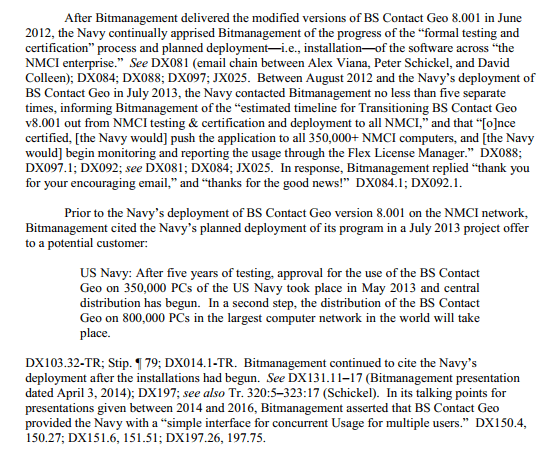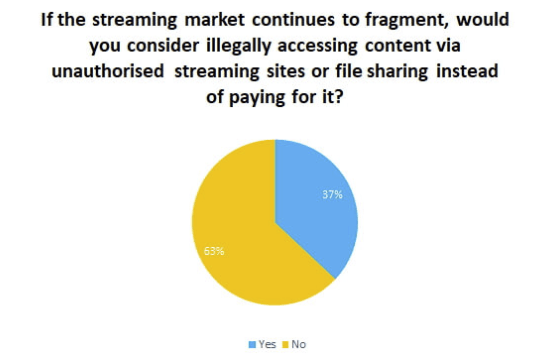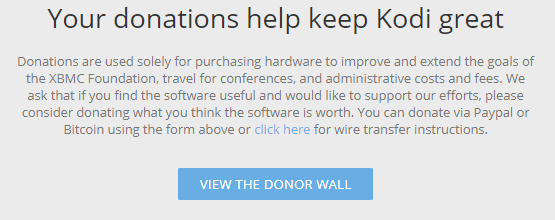U.S. Navy Fights Off Mass Software Piracy Lawsuit
samedi 28 septembre 2019 à 21:59
In 2011 and 2012, the US Navy began using BS Contact Geo, a 3D virtual reality application developed by German company Bitmanagement.
After some initial testing, the Navy agreed to purchase licenses, understanding that these could be used across its network, as long as the number of simultaneous users was limited to a few dozen.
Bitmanagement saw things differently. The software vendor said it never authorized this type of use. When the company was informed that the Navy had installed the software on 558,466 computers, that came as a surprise.
This stance was repeated in a Federal Claims Court complaint filed by Bitmanagement three years ago. The German company accused the US Navy of mass copyright infringement and demanded damages totaling hundreds of millions of dollars.
In the years that followed, both parties conducted discovery. Initially, most of the court documents were made public, but more recently they were shielded from public view. What we do know, however, is that a week-long trial took place in Washington in April.
Following the trial and the post-trial briefs, the Court has now decided to dismiss the copyright infringement claim against the US Government.
“Although Bitmanagement established a prima facie case of copyright infringement, the evidence shows that Bitmanagement authorized the U.S. Navy’s copying of BS Contact Geo version 8.001. Therefore, the Court finds in favor of Defendant, the United States, and Plaintiff’s Complaint is hereby dismissed,” the verdict reads.
In a detailed opinion and order, published this week, Senior Judge
Edward J. Damich explains how this conclusion was reached.
The dispute appears to have begun when the US Navy decided that it would like to run the software across its entire network. This meant that it would be installed on hundreds of thousands of computers, with “Flexera” software keeping track of the number of simultaneous users.
Bitmanagement didn’t offer such a license by default, so the Navy requested this option separately. These requests took place through a reseller, Planet 9 Studios, which complicated matters. After several back and forths, the Navy was convinced that it had permission, but Bitmanagement later disagreed.
What’s clear is that the Navy never had a direct contractual relationship with Bitmanagement, so there was no direct permission given. This means that the Court had to review the conversations and exchanges that took place, to determine which side was right.
Here, the Court concluded that it’s clear that Bitmanagement authorized the Navy to use the software across its network with the network use (Flexera) license.
The evidence shows that Bitmanagement itself offered a custom license and changed the software installer to be used with a Flexera license. Through email communication, the German software company was repeatedly informed about this intended use, which it confirmed.
In addition, Bitmanagement cited the Navy’s ‘networked’ use of its software to a potential customer, with the following statement.
“After five years of testing, approval for the use of the BS Contact Geo on 350,000 PCs of the US Navy took place in May 2013 and central distribution has begun. In a second step, the distribution of the BS Contact Geo on 800,000 PCs in the largest computer network in the world will take place.”

Based on these and many other pieces of evidence, the Court concluded that the US Government can’t be held liable for copyright infringement.
“Together, these interactions unequivocally show that Bitmanagement was not only aware that the Navy planned to install BS Contact Geo “across a broad spectrum of the NMCI realm” but also that Bitmanagement authorized such installations,” the Court writes.
This means that after three years the US Navy has successfully defended the piracy claims. Instead of a potential $600 million judgment in its favor, Bitmanagement has no other option than to retreat.
—
A copy of the order and opinion of Senior Judge Edward J. Damich of the United States Court of Federal Claims is available here (pdf).
Source: TF, for the latest info on copyright, file-sharing, torrent sites and more. We also have VPN reviews, discounts, offers and coupons.







